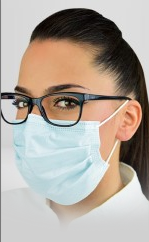WHO Says Vaccinated People Should Continue Wearing Masks — Here’s Why.
As the delta variant of COVID-19 quickly becomes the most dominant strain of the virus around the world, the World Health Organization announced on Friday that even people who have been fully vaccinated should continue to follow coronavirus-specific safety measures, including wearing medical face masks and social distancing when around others.
This announcement comes after several other health organizations and government officials have suggested that masks — both outdoors and indoors — are no longer needed for people who are fully vaccinated in the U.S. And this has led to confusion.
Last month, in a guideline memo called “When You’ve Been Fully Vaccinated,” the Centers for Disease Control and Prevention announced that vaccinated people “can resume activities that you did prior to the pandemic.” This included participating in “activities without wearing a mask or physically distancing, except where required by federal, state, local, tribal, or territorial laws, rules, and regulations, including local business and workplace guidance.”
According to the CDC, those who are fully vaccinated also “do not need to get tested before or after travel or self-quarantine after travel” within the United States and “do not need to stay away from others or get tested unless you have symptoms.”
So, why did WHO shift their position? During a news briefing on Friday, Mariangela Simao, MD, the WHO assistant director-general for access to medicines and health products, stated that “community transmission” of the coronavirus continues to be the reason why safety guidelines are still needed, even for people who are fully vaccinated. And this is, according to WHO, an even greater concern with the delta strain.
“Vaccine alone won’t stop community transmission,” she said. “People need to continue to use masks consistently, be in ventilated spaces, hand hygiene … the physical distance, avoid crowding. This still continues to be extremely important, even if you’re vaccinated when you have a community transmission ongoing.”
“People cannot feel safe just because they had the two doses. They still need to protect themselves,” Dr. Simao noted.
The rapid rise of the delta variant in the U.S., the United Kingdom, India, China, and other countries have already prompted the reintroduction of lockdowns and curfews in places like Australia, South Africa, and Thailand. A two-week lockdown in Sydney began on Saturday — specifically because of an outbreak of the delta variant. South Africa also enacted a two-week curfew and halted travel to and from countries with high COVID cases, as well as indoor dining and the sale of alcohol, due to the delta variant.
Governments around the world are doing what they can to curb the spread of the variant, but the discovery of this strain is very recent, and as a result, experts are still learning about it, what it means, and how people can best stay safe. While it’s been previously stated by Britain’s health minister that people who are fully vaccinated are mostly protected from the delta variant, new findings showed that half of the adults in Israel infected with the delta variant had already been vaccinated.
According to Professor Ran Balicer, MD, PhD, a leader on Israel’s COVID-19 expert advisory panel and chief innovation officer for health service organization Clalit, vaccinations are never 100% effective, and “breakthrough cases” remain likely — especially when it comes to the delta variant. While it’s not reported whether or not the adults in Israel who contracted the delta variant were asymptomatic, Dr. Balicer reported that they did not have severe cases, and the country’s current COVID death rate remains near zero, thanks to mass vaccinations.
Due to the delta variant still being a newer threat, there is no exact data detailing the risk that vaccinated people currently face. WHO officials also confirmed Friday that the delta variant is the most widely spread strain of the coronavirus thus far and, because of that, vaccinations and taking COVID-specific safety measures are the world’s best chance to protect themselves against it, CNBC reports. WHO also warned that the virus is poised to “pick off” those who are most at risk as it continues to spread, including people who haven’t been vaccinated.
As of now, the CDC has not changed their recommendations for vaccinated people in the U.S. Of course, as we know from our experiences in 2020, guidelines could quickly change as more information about the delta variant becomes available. For now, pay attention to the recommendations in your area — and if you’re uncertain, it’s always okay to err on the side of caution and heed your own comfort levels. But one thing’s clear: If you haven’t already, it’s essential to get vaccinated.
“Six hundred thousand-plus Americans have died, and with this delta variant you know there’s going to be others as well. You know it’s going to happen. We’ve got to get young people vaccinated,” President Joe Biden said.

